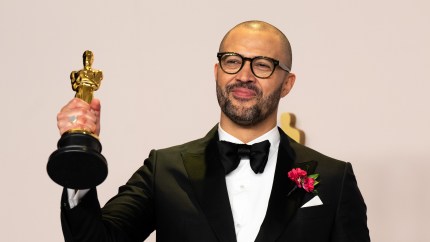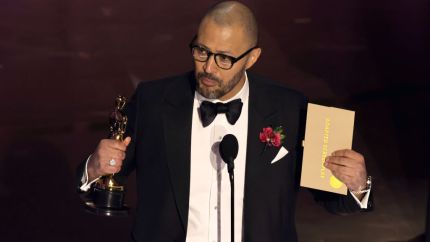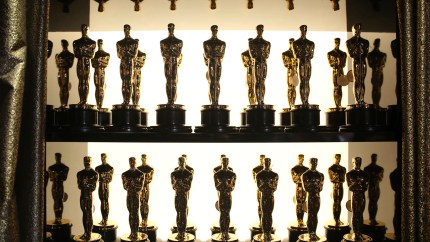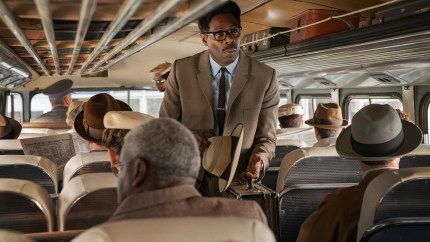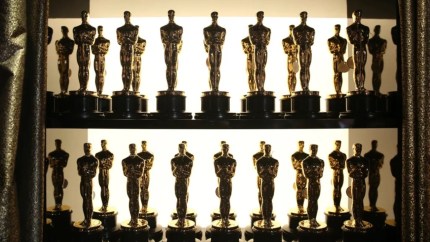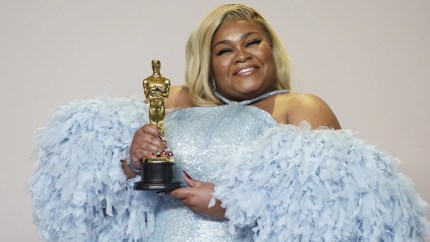How Cord Jefferson made the Oscars not-so-white
OPINION: The Academy Award winner’s post-Oscar response perfectly explained Hollywood's aversion to "Black movies."

Editor’s note: The following article is an op-ed, and the views expressed are the author’s own. Read more opinions on theGrio.
A few weeks ago, the owner of a local supermarket informed me that he was halfway through my latest book, “Black AF History: The Unwhitewashed Story of America” and said that he’d never read anything like it. His compliment didn’t mention history, research or storytelling, but because I’ve received the same compliment from so many Black readers, I knew exactly where he was going.
“I love the stories about your family,” he explained. “You never hear stories about regular Black families.”
“Yeah,” I replied.
That’s all. That’s the whole story.
Recommended Stories
On Sunday, “Black screenwriter” and director Cord Jefferson took home the Oscar for best adapted screenplay for penning “American Fiction,” a Black movie about a “Black novelist” who was tired of writing “Black books.” During his victory speech, Jefferson graciously thanked his colleagues for “trusting a 40-year-old Black guy who’s never directed anything before” and beseeched studio executives to “recognize that there are so many people out there who want the opportunity that I was given.” But it was Jefferson’s backstage press conference that ruffled the most feathers.
“There’s an audience for things that are different,” Jefferson explained. “A story with Black characters that’s going to appeal to a lot of people doesn’t need to take place on a plantation. Doesn’t need to take place in the projects. Doesn’t need to have drug dealers in it. Doesn’t need to have gang members in it. There’s an audience for different depictions of people’s lives. There is a market for depictions of Black life that are as broad and as deep as any other depictions of people’s lives.”
Some viewers, both Black and white, interpreted the newly minted Oscar winner’s public ponderance as an elitist shot at Black filmmakers or movies about Black people. Others viewed Jefferson’s critique as part of an ongoing dialogue in Black America about Hollywood’s obsession with “slave movies,” white saviors and films that fetishize Black trauma.
I am not privy to Jefferson’s inner dialogue, so it is impossible to know which side of this argument is more correct. Regardless of his intentions, there was a subtle, underlying point in Jefferson’s speech that everyone seemed to miss:
Why won’t Hollywood let Black people make “white movies”?
While mainstream media outlets are eager to discuss “Black movies” — movies with majority Black casts or Black actors in the leading roles — the converse is rarely discussed (even during the 337-day span of white history months). This is why no one considers Martin Scorsese a “white director,” even though he has managed to make dozens of films over a half-century career without a single Black lead.
White movies are called “movies.”
Perhaps the most astonishing thing about “American Fiction” is its lack of remarkability. You’d need four hands to count the number of films depicting a regular white family dealing with grief, loss and family turmoil. Erica Alexander was as good in “American Fiction” as Meryl Streep in “August: Osage County” or Frances McDormand in “Nomadland” or any of the Oscar-winning performances by a white woman playing a white woman. While Jeffrey Wright’s portrayal was spot-on, it doesn’t come close to his gut-wrenching performances in “All Day and a Night” or “O.G.” While Cord Jefferson made an unquestionably good movie, it is even more remarkable that a Black filmmaker was allowed to make a movie that didn’t rely on the previously mentioned tropes. The fact that the movie’s box office revenue more than doubled its budget is not surprising. The studios who relegate Black films to lower budgets have seen the studies that show “African American films perform better at the box office.”
In Caucasian cinema, making a good, interesting white movie is the surest path to garnering critical acclaim. Young white actresses can strike Oscar gold by playing a brave housewife who stares forlornly into the middle distance (To be fair, I can’t tell Cate Blanchett from Kate Winslet, so I refer to all young white actresses as “Gwyneth Paltrows”). More white thespians have won multiple Oscars (94) than the total number of Black actors and actresses who were ever even nominated (76).
But, because numerous studies show that white audiences are less interested in films with “minority cast members” and are less likely to empathize with Black characters, Black actors and moviemakers are required to showcase a particular kind of Black pain to achieve the same accolades as their white counterparts. White audiences cannot see Black people’s humanity unless it falls into one of four categories:
- Be a real person: One-third of Black Oscar-nominated performances depict historical figures, including Ray Charles (Jamie Foxx), Idi Amin (Forest Whitaker) Richard Williams (Will Smith) and Fred Hampton (Daniel Kaluuya)
- Be of service: You can be a slave (Hattie McDaniel in “Gone With the Wind”; Lupita Nyong’o in “12 Years a Slave”; Denzel Washington in “Glory”) a servant, (Octavia Spencer in “The Help”; Sidney Poitier in “Lilies of the Field”; Morgan Freeman in “Driving Miss Daisy”) or simply of service to a white character. (Whoopi Goldberg in “Ghost”; Morgan Freeman in “Million Dollar Baby”)
- Be extraordinary: A Black person who can sing, dance, run or do something that white people value, can almost become human (Mahershala Ali in “Green Book,” Jennifer Hudson in “Dreamgirls,” Cuba Gooding Jr. in “Jerry Maguire”)
- Be in pain: High stakes, hyperbolic trauma is one of the few lenses through which white people can see Black people’s humanity. (Da’Vine Joy Randolph in “The Holdovers”; Mary J. Blige in “Mudbound”; Halle Berry in “Monster’s Ball”)
None of this means that the Academy of Motion Picture Arts and Sciences voters hate Black people or think less of the movies we make. The best Black art, music and other forms of cultural meaning-making accurately depict Black life and inform Black people who they are to each other. Conversely, an Academy Awards voter’s job is to evaluate Black art through the lens of how everyone else sees Black people. And, because of that specific objective, the Oscars are supposed to be white.
In fact, “American Fiction’s” most noteworthy achievement may be that white people noticed it.
Jefferson’s point was not that movies about thugs, maids and slaves are less worthy of attention or accolades. It wasn’t even about the need for mid-budget movies (studios greenlight mid-budget white movies all the time). His ultimate point was that all stories depicting Black life are worthy of being told because Black people are worthy. Or, as some would call it:
Diversity.
Equity.
Inclusion.
That’s all. That’s the whole story.
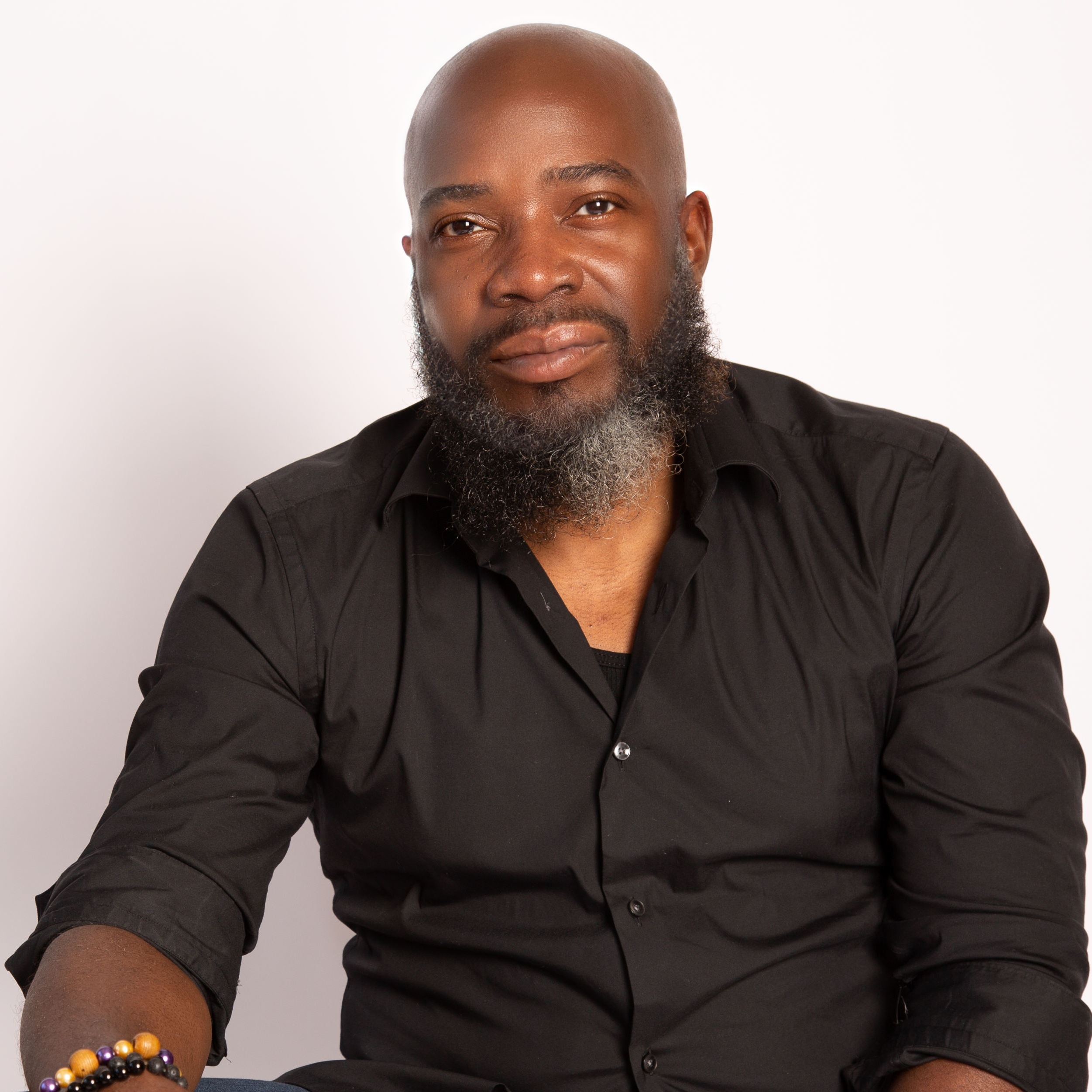
Michael Harriot is a writer, cultural critic and championship-level Spades player. His book, Black AF History: The Unwhitewashed Story of America, will be released in September.
Never miss a beat: Get our daily stories straight to your inbox with theGrio’s newsletter.
